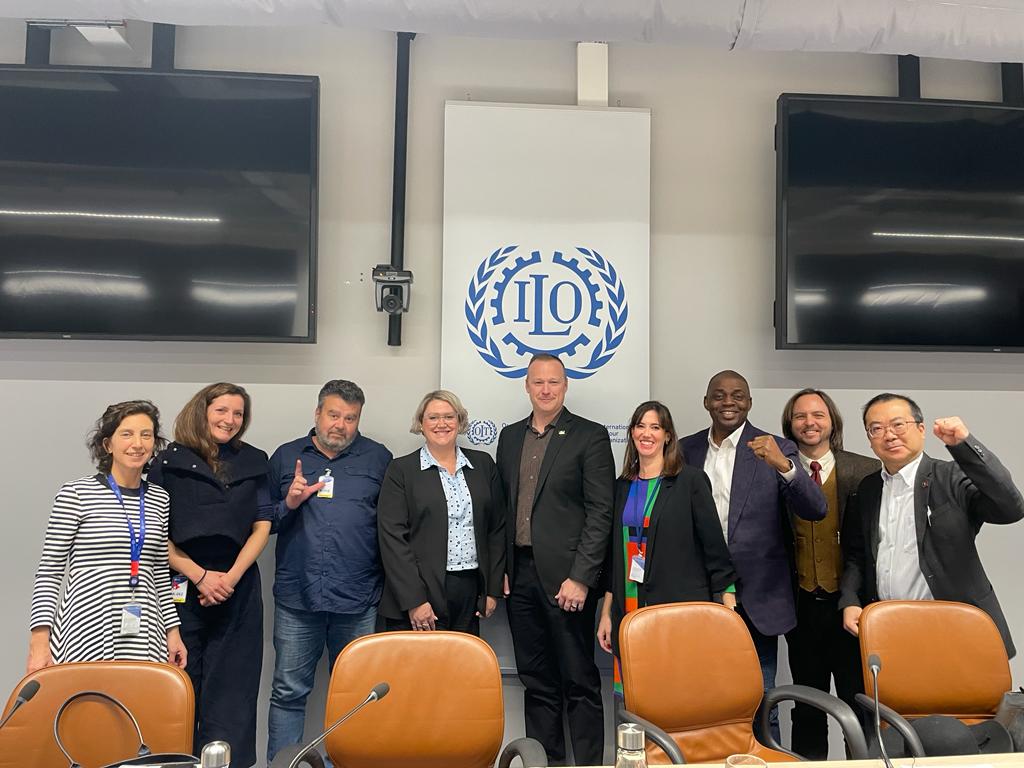15 December, 2022IndustriALL was part of a workers’ delegation that negotiated a new agreement on the future of work in the oil and gas sector.
Late on Friday, 2 December, negotiations between representatives of workers, governments and employers concluded in an agreement on the future of work in the oil and gas sector after a week-long technical meeting at the ILO headquarters in Geneva.
Meetings of this kind provide guidance on how to address issues in a sector. They are particularly important as new sectors arise, or existing sectors face major changes due to the twin transitions of climate and technology. Oil and gas, as a major contributor to greenhouse gas emissions, will be very heavily impacted by the need to decarbonize. For unions, it is essential that this happens in a planned and structured way, so that new jobs can be created before old jobs disappear.
The union delegation were experts from the oil and gas sector, democratically elected to represent unions from the USA, Brazil, Colombia, Nigeria, Iraq, Norway, Australia and Indonesia. They were supported by the ITUC, IndustriALL Global Union and industriAll European Union.
The ILO office developed a report that served as a basis for discussion. At the beginning of the week, questions about challenges, opportunities, good practice and demands were raised. The negotiators presented their points of view and main demands. Based on these inputs, the ILO office drafted the first text, and the parties negotiated amendments over the course of the week.
For the workers’ representatives, the key demands were:
- Decent union jobs in the future, negotiated through social dialogue, with unions included in the decision-making process.
- Reference to the high level of outsourcing in the industry, of the responsibilities of governments when developing energy plans, and of employers for supply chain due diligence.
- A finance mechanism for just transition in the sector.
- Investment in mid- to long-term energy plans, including skilling and reskilling.
The union delegation was unsatisfied with both the process of the meeting and the outcome. An opportunity to address many pressing issues was missed, particularly the problem of outsourced workers. This was due to a lack of commitment by the employers. None of the major companies in the sector attended the meeting, and the employers’ chief negotiator, from the International Organization of Employers (IOE), had no specific sector experience, since the IOE negotiates agreements in tourism, education, agriculture, transport and energy and other sectors.
Because the outcomes were not as prescriptive as unions had hoped, the possibility of developing a sector-specific just transition guide will be raised after the ILO governing body meeting next summer.
IndustriALL energy and just transition director Diana Junquera Curiel said:
“When it comes to just transition in this industry, the concerns of workers include the financing of the transition, social protection and the quality and number of decent jobs that will be available. If the transition doesn’t happen through social dialogue, with social protection, collective bargaining and inclusiveness, the future will be unsustainable for all.”
In a closing statement, the chair of the workers’ group, Mike Smith of the USW, said:
“We are pleased to have reached agreement on this document after a week of robust negotiation. We trust that the conclusions will be a step in the long road to a just transition in the oil and gas industry, with the maintenance of a healthy and productive industry that facilitates the creation of decent work to replace any jobs lost with jobs of equivalent or better value.
“We regret that no reference is made to outsourced workers in this document. It is a great concern to us that outsourcing is prevalent in the oil and gas sector, that this practice undermines conditions, and that outsourced workers lack an institutional voice to address their concerns.
“We will continue to work to ensure that all those working in the oil and gas industry, whether direct or outsourced workers, enjoy freedom of association, health and safety at work, and good working conditions won through collective bargaining agreements.”





